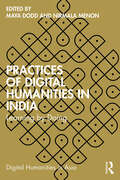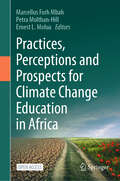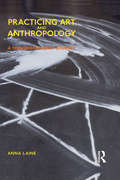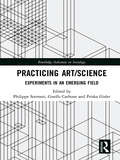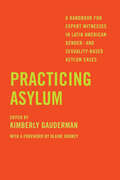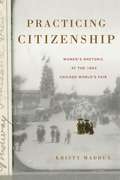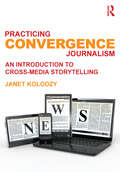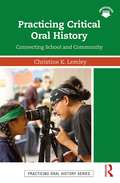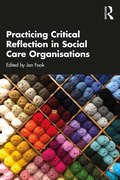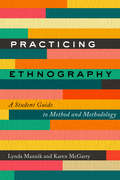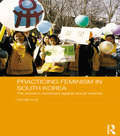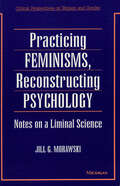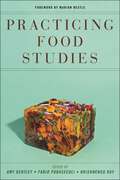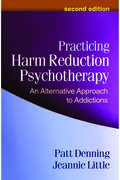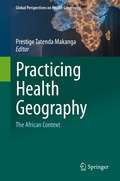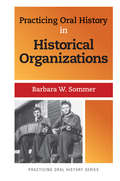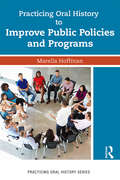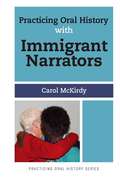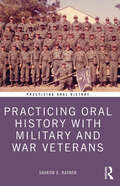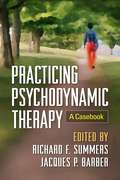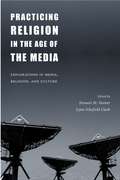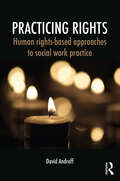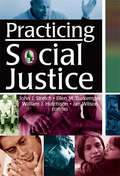- Table View
- List View
Practices of Digital Humanities in India: Learning by Doing
by Nirmala Menon Maya DoddThis book represents examples of innovations in digital humanities (DH) efforts across India while theorizing disparate challenges and its negotiations. It examines DH projects that have spanned private and public efforts, institutionally sanctioned lab-work, and crowd-sourced programmes of public significance and shows how collectively they demonstrate the potential paths of DH in India. The essays in the volume highlight the two fundamental challenges for DH – acts of curation of new scales and the creation of platforms that can assist in the collation and analysis of these digital archives – and changes in learning behaviour. They examine the transformation of the university, and the opening up of new relationships between knowledge and audience in concomitant spaces of scholarship such as libraries, archives, and museums. The volume brings to the fore citizen efforts to document, record, and preserve as well as create new avenues of study and forge networks of scholarship that look very different from those of traditional academia. It also foregrounds the challenges of location and addresses the questions of how DH should be taught in India and how to build digital infrastructures. A go-to guide for DH efforts in India, this book will be an essential text for courses on digital humanities, library and information sciences, and the future of experiential learning.
Practices, Perceptions and Prospects for Climate Change Education in Africa
by Petra Molthan-Hill Marcellus Forh Mbah Ernest L. MoluaThis open access book presents peer-reviewed chapters that introduce the subject of climate change within formal and informal sectors of education in Africa, as key to building the capacity of current and future generations to address the most pressing global issue. An insight into existing practices, perceptions, and prospects for climate change education in Africa can bring to light relevant frameworks that can support a climate-resilient future in the continent. Among others, the book contends that there is a need to rethink current practices of climate change education in the continent by optimizing Indigenous knowledge systems and context-relevant pedagogies as important strategies. Governments, civil society, and other stakeholders in Africa can draw on the rich insights captured in this book as they consider feasible approaches to resolve the current climate crisis.
Practicing Art and Anthropology: A Transdisciplinary Journey (Criminal Practice Ser.)
by Anna LainePracticing Art and Anthropology presents an in-depth exploration of transdisciplinary work in the expanding space between art and anthropology. Having trained and worked as an artist as well as an anthropologist, Anna Laine’s decades-long engagement in art practice, artistic research and anthropology provide her with a unique perspective on connections between the two fields, both in theory and in practice. Intertwining artistic and anthropological ways of working, Laine asks what it means to engage a transdisciplinary stance when academia requires a specific disciplinary belonging. In order to expand the methods of producing academic knowledge by going beyond conventional approaches to research, she draws on examples from her own work with Tamils in India and the UK to present an original take on how we can cross the boundaries between art and anthropology to reach multiple dimensions of understanding. Offering exceptional breadth and detail, Practicing Art and Anthropology provides a unique approach to the discussion. An important read for students and scholars in art and anthropology as well as artists and anyone interacting in the space in-between.
Practicing Art/Science: Experiments in an Emerging Field (Routledge Advances in Sociology)
by Philippe Sormani Guelfo Carbone Priska GislerOver the last two decades, multiple initiatives of transdisciplinary collaboration across art, science, and technology have seen the light of day. Why, by whom, and under what circumstances are such initiatives promoted? What does their experimental character look like - and what can be learned, epistemologically and institutionally, from probing the multiple practices of "art/science" at work? In answer to the questions raised, Practicing Art/Science contrasts topical positions and insightful case studies, ranging from the detailed investigation of "art at the nanoscale" to the material analysis of Leonardo’s Mona Lisa and its cracked smile. In so doing, this volume brings to bear the "practice turn" in science and technology studies on the empirical investigation of multifaceted experimentation across contemporary art, science, and technology in situ. Against the background of current discourse on "artistic research," the introduction not only explains the particular relevance of the "practice turn" in STS to tackle the interdisciplinary task at hand, but offers also a timely survey of varying strands of artistic experimentation. In bringing together ground-breaking studies from internationally renowned scholars and upcoming researchers in sociology, art theory and artistic practice, as well as history and philosophy of science, Practicing Art/Science will be essential reading for practitioners and professionals in said fields, as well as postgraduate students and representatives of higher education and research policy more broadly.
Practicing Asylum: A Handbook for Expert Witnesses in Latin American Gender- and Sexuality-Based Asylum Cases
by Kimberly GaudermanA free ebook version of this title is available through Luminos, University of California Press's Open Access publishing program. Visit www.luminosoa.org to learn more. This multidisciplinary volume brings together experienced expert witnesses and immigration attorneys to highlight best practices and strategies for giving expert testimony in asylum cases. As the scale and severity of violence in Latin America has grown in the last decade, scholars and attorneys have collaborated to defend the rights of immigrant women, children, and LGBTQ+ persons who are threatened by gender-based, sexual, and gang violence in their home countries. Researchers in anthropology, history, political science, and sociology have regularly supported the work of immigration lawyers and contributed to public debates on immigration reform, but the academy contains untapped scholarly expertise that, guided by the resources provided in this handbook, can aid asylum seekers and refugees and promote the fair adjudication of asylum claims in US courts. As the recent refugee crisis of immigrant mothers and children and unaccompanied minors has made clear, there is an urgent need for academics to work with other professionals to build a legal framework and national network that can respond effectively to this human rights crisis.
Practicing Citizenship: Women’s Rhetoric at the 1893 Chicago World’s Fair (Rhetoric and Democratic Deliberation #20)
by Kristy MadduxBy 1893, the Supreme Court had officially declared women to be citizens, but most did not have the legal right to vote. In Practicing Citizenship, Kristy Maddux provides a glimpse at an unprecedented alternative act of citizenship by women of the time: their deliberative participation in the Chicago World’s Fair of 1893.Hailing from the United States and abroad, the more than eight hundred women speakers at the World’s Fair included professionals, philanthropists, socialites, and reformers addressing issues such as suffrage, abolition, temperance, prison reform, and education. Maddux examines the planning of the event, the full program of women speakers, and dozens of speeches given in the fair’s daily congresses. In particular, she analyzes the ways in which these women shaped the discourse at the fair and modeled to the world practices of democratic citizenship, including deliberative democracy, racial uplift, organizing, and economic participation. In doing so, Maddux shows how these pioneering women claimed sociopolitical ground despite remaining disenfranchised.This carefully researched study makes significant contributions to the studies of rhetoric, American women’s history, political history, and the history of the World’s Fair itself. Most importantly, it sheds new light on women’s activism in the late nineteenth century; even amidst the suffrage movement, women innovated practices of citizenship beyond the ballot box.
Practicing Citizenship: Women’s Rhetoric at the 1893 Chicago World’s Fair (Rhetoric and Democratic Deliberation)
by Kristy MadduxBy 1893, the Supreme Court had officially declared women to be citizens, but most did not have the legal right to vote. In Practicing Citizenship, Kristy Maddux provides a glimpse at an unprecedented alternative act of citizenship by women of the time: their deliberative participation in the Chicago World’s Fair of 1893.Hailing from the United States and abroad, the more than eight hundred women speakers at the World’s Fair included professionals, philanthropists, socialites, and reformers addressing issues such as suffrage, abolition, temperance, prison reform, and education. Maddux examines the planning of the event, the full program of women speakers, and dozens of speeches given in the fair’s daily congresses. In particular, she analyzes the ways in which these women shaped the discourse at the fair and modeled to the world practices of democratic citizenship, including deliberative democracy, racial uplift, organizing, and economic participation. In doing so, Maddux shows how these pioneering women claimed sociopolitical ground despite remaining disenfranchised.This carefully researched study makes significant contributions to the studies of rhetoric, American women’s history, political history, and the history of the World’s Fair itself. Most importantly, it sheds new light on women’s activism in the late nineteenth century; even amidst the suffrage movement, women innovated practices of citizenship beyond the ballot box.
Practicing Convergence Journalism: An Introduction to Cross-Media Storytelling
by Janet KolodzyPracticing Convergence Journalism teaches budding journalists how to make the most of digital technology to tell their stories effectively across multiple media platforms—in print, audio, video and online. Janet Kolodzy addresses multi-media and cross-media thinking, organizing, reporting and producing for both short-form spot news and long-form features. Her approach focuses on storytelling principles, not just specific technical practices, providing journalists with the mindset and skills they need to adapt their writing and reporting for the tools of today and tomorrow. With this book and the aid of its companion website, students learn how to: Develop a cross-media mode of journalistic thinking that will result in stories suitable for a fast-paced, multitasking and mobile audience. Decide when visuals are useful and necessary, and understand how to capture, select and organize them to effectively enhance a reader’s understanding of a story. Put together various elements of storytelling (writing, audio, moving and still pictures) for an interactive journalistic experience.
Practicing Cooperation: Mutual Aid beyond Capitalism (Diverse Economies and Livable Worlds)
by Andrew ZitcerA powerful new understanding of cooperation as an antidote to alienation and inequality From the crises of racial inequity and capitalism that inspired the Black Lives Matter movement and the Green New Deal to the coronavirus pandemic, stories of mutual aid have shown that, though cooperation is variegated and ever changing, it is also a form of economic solidarity that can help weather contemporary social and economic crises. Addressing this theme, Practicing Cooperation delivers a trenchant and timely argument that the way to a more just and equitable society lies in the widespread adoption of cooperative practices. But what renders cooperation ethical, effective, and sustainable?Providing a new conceptual framework for cooperation as a form of social practice, Practicing Cooperation describes and critiques three U.S.-based cooperatives: a pair of co-op grocers in Philadelphia, each adjusting to recent growth and renewal; a federation of two hundred low-cost community acupuncture clinics throughout the United States, banded together as a cooperative of practitioners and patients; and a collectively managed Philadelphia experimental dance company, founded in the early 1990s and still going strong. Through these case studies, Andrew Zitcer illuminates the range of activities that make contemporary cooperatives successful: dedicated practitioners, a commitment to inclusion, and ongoing critical reflection. In so doing he asserts that economic and social cooperation must be examined, critiqued, and implemented on multiple scales if it is to combat the pervasiveness of competitive individualism.Practicing Cooperation is grounded in the voices of practitioners and the result is a clear-eyed look at the lived experience of cooperators from different parts of the economy and a guidebook for people on the potential of this way of life for the pursuit of justice and fairness.
Practicing Critical Oral History: Connecting School and Community (Practicing Oral History)
by Christine K. LemleyPracticing Critical Oral History: Connecting School and Community provides ways and words for educators to use critical oral history in their classroom and communities in order to put their students and the voices of people from marginalized communities at the center of their curriculum to enact change. Clearly and concisely written, this book offers a thought-provoking overview of how to use stories from those who have been underrepresented by dominant systems to identify a critical topic, engage with critical processes, and enact critical transformative-justice outcomes. Critical oral history both writes and rights history, so that participants—both interviewers and narrators—in critical oral history projects aim to contextualize stories and make the voices and perspectives of those who have been historically marginalized heard and listened to. Supplemented throughout with sample activities, lesson-plan outlines, tables, and illustrative figures, Practicing Critical Oral History: Connecting School and Community is an essential resource for all those interested in integrating the techniques of critical oral history into an educational setting.
Practicing Critical Reflection in Social Care Organisations
by Jan FookThis book explores concrete examples of different strategies and activities aimed at creating and embedding critically reflective learning and working environments within organisations whose prime function is social care. Critical reflection has long been recommended as a general professional skill and is a core component of the practice capabilities in social work in countries across the Western world. However, despite unequivocal support for it in social work education, sustaining critical reflection within organisations as both an individual and collective practices, supported by organisational cultures, is problematic. With contributions from social work practitioners and educators who have sought to embed critical reflection into broader activities and cultures within their organizations, the book addresses common features of critical reflection, and challenges and benefits in specific case studies. This book will inspire and develop new thinking and vision about being critically reflective in organisations, and facilitate efforts to improve the learning and working experience in addition to that of service quality and delivery. It will be required reading for all undergraduate and postgraduate social work modules focusing on management, leadership organizational change, and professional education.
Practicing Ethnography: A Student Guide to Method and Methodology
by Lynda Mannik Karen McGarryBuilding on the "studying up" trend in anthropology, this book offers a theoretically informed guide to ethnographic methods that is also practical in approach, and reflects the challenges and concerns of contemporary ethnography. Students draw from vignettes situated within North America to learn how various methods work in the real world, and how ethnography informs contemporary anthropological theory. Exercises and assignments encourage students to practice these methods in a familiar context, and a sustained focus on visual methodologies offers coverage not found in other books. The result is a text that discusses both practical and theoretical issues in contemporary ethnography while equipping students with a set of transferable skills.
Practicing Feminism in South Korea: The women’s movement against sexual violence (ASAA Women in Asia Series)
by Kyungja JungThe Korean women’s movement, which is seen in both Western and non-Western countries as being exemplary in terms of women’s activism, experienced a dramatic change in its direction and strategy in the early 1990s. At the heart of the new approach was an increasing focus on sexual violence, which has had a huge impact on bringing women’s issues onto the public agenda in Korea. This book examines feminist practice in Korea by analyzing the experiences of the country’s first sexual assault center, the Korea Sexual Violence Relief Center. Based on extensive original research, including interviews with activists and extensive participant observation, it explores why feminist activists in South Korea chose to organize around the issue of sexual violence, the strategies it used to do so, what impact the movement has made and what challenges it still faces to achieve its objectives.
Practicing Feminisms, Reconstructing Psychology: Notes on a Liminal Science
by Jill G MorawskiPracticing Feminisms, Reconstructing Psychology is a valuable survey of developments to date in feminist psychology and a provocative assessment of its future possibilities. For many psychologists engaged with the questions raised by modern feminist, the reconciliation of scientific methods and feminist commitments has been a complicated and sometimes perplexing project. In her book, Jill Morawski attempts to move beyond the apparent impasses toward a constructive feminist psychology. The book assesses the substantive advances feminist psychology has made and proposes ways in which those transformations can lead to new research and methodologies. These transformative interventions, Morawski argues, have often consisted of local and partial alterations to established methods rather than a programmatic "metatheory" or a formulaic methodology. She reviews a variety of exemplary studies that demonstrate how such intermittent practices, taken together, constitute a groundword for radically new forms of psychological inquiry. The study describes feminist challenges to long-held conceptions of objectivity, subjectivity, and validity and examines emergent problems and ongoing debates. The feminist innovations discussed reveal the impossibility of a pure and abstract objective stance and demonstrate the feasibility of situated and critical objective practices. Morawski also shows how experimental investigative strategies are generating new perspectives on subjectivity, which incorporate agency as well as dependence, reflection as well as reactivity. Feminist inquiry is modifying the procedures through which knowledge is warranted, with different evaluations of validation processes. Despite the transformations in these areas, the pursuit of a feminist psychology remains in transition, in a "liminal" space. Among the emerging issues Morawski explores are vicissitudes of reflexivity, the investigator's self, and the cultural bases of psychological knowledge.
Practicing Food Studies
by Amy Bentley, Fabio Parasecoli, and Krishnendu RayAn introduction to the burgeoning field of food studiesPopular and intellectual interest in food is on the rise. The breadth of concerns surrounding food ranges from animal welfare and climate change’s impact on food production to debates on the healthfulness of carbohydrates and fats, and fair compensation for restaurant and farm workers. Not only is there an expanding conversation about the ways in which we produce and consume our food, but there is growing attention being placed on the myriad ways in which food expresses and shapes shifting identities.Practicing Food Studies details the turn of the twenty-first century development and flourishing of food studies as a multidisciplinary field, focusing on its establishment at New York University. Food studies scholars have come from various fields such as history, sociology, economics, political science, nutrition, or public policy, but often felt limited by the conventions of their traditional discipline. Many gravitated to food studies to be able to describe and critically examine their specific areas of interest beyond the borders of academic disciplines. This volume explores the history of knowledge in which NYU Food Studies emerged, providing the opportunity to reflect on how academic fields are created and evolve as a response to institutional constraints and opportunities, the landscape of ideas, social movements, and public conversations.Practicing Food Studies is a compelling collection of essays compiling the research, ideas, and experiences of faculty members and graduates of the NYU Food Studies program—mapping the paths for intellectual and social engagement with food systems and its most urgent issues.
Practicing Harm Reduction Psychotherapy, Second Edition: An Alternative Approach to Addictions
by Patt Denning Jeannie LittleThis acclaimed clinical guide has helped thousands of clinicians put the proven principles of harm reduction into practice with therapy clients who have substance use problems. Written by pioneers in the field, the book shows how to do effective therapeutic work with people still using alcohol or other drugs. It provides clear guidelines for conducting comprehensive assessments, making collaborative treatment decisions, and implementing interventions that combine motivational, cognitive-behavioral, and psychodynamic strategies. The focus is reducing drug-related harm while also addressing co-occurring psychological and emotional difficulties. Detailed clinical illustrations are featured throughout. New to This Edition, Reflects over a decade of research advances and the tremendous growth of harm reduction clinical practice and training. Section on applications, with chapters on community-based settings, harm reduction groups, and working with families and friends. Chapters on biological and psychodynamic aspects of treatment. Expanded discussions of trauma, cultural sensitivity, and ethics. Supplemental resources and training materials at the authors' website.
Practicing Health Geography: The African Context (Global Perspectives on Health Geography)
by Prestige Tatenda MakangaThis volume uniquely presents case studies on health geography in Africa, and analyzes health practices in different African regions to illustrate a unified perspective to the geographies of health. The book describes various contemporary and traditional themes that have characterized the discipline of health geography, and uses its 13 case studies across 14 chapters to challenge the perceived dichotomy between health geography and medical geography among health researchers and practitioners. In 3 sections, the book provides readers with a comprehensive and interdisciplinary approach to understanding health geography in Africa.The first chapter introduces the major theories and perspectives in health geography, and how these characteristics apply to health geography practices in Africa. Section 1 discusses the different uses of space-based analyses in health geography, including geo-data infrastructures, geographies of disease burden, spatial epidemiology, spatially precise public health, and spatial access to health. Section 2 discusses the different uses of place-based analyses in health geography, including health representation, healthcare access, food allergies, and health determinants. Section 3 addresses how geography is incorporated into decision processes in Africa, and how policy planning shapes health-related interventions at the population and individual level. The case studies here discuss geo-enabling health records, health policy, public health planning, and mobile health geographies.
Practicing Oral History in Historical Organizations (Practicing Oral History #4)
by Barbara W SommerIt has been half a century since the last book that addressed how historical societies can utilize oral history. In this brief, practical guide, internationally known oral historian Barbara W. Sommer applies the best practices of contemporary oral historians to the projects that historical organizations of all sizes and sorts might develop. The book -covers project personnel options, funding options, legal and ethical issues, interviewing techniques, and cataloging guidelines;-identifies helpful steps for historical societies when developing and doing oral history projects;-includes a dozen model case studies;-provides additional resources, templates, forms, and bibliography for the reader.
Practicing Oral History to Improve Public Policies and Programs (Practicing Oral History)
by Marella HoffmanThe use of contemporary oral history to improve public policies and programs is a growing, transdisciplinary practice. Indispensable for students and practitioners, Practicing Oral History to Improve Public Policies and Programs is the first book to define the practice, explain how policy-makers use it, show how it relates to other types of oral history, and provide guidance on the ethics and legalities involved. Packed with case studies from disciplines as diverse as medicine, agriculture, and race relations, as well as many examples from the author’s own work, this book provides an essential overview of the current state of the field within oral history for public policy and a complete methodology for the process of designing and implementing an oral history project. The comprehensive How To section demonstrates how to use the practice to advance the reader’s career, their chosen discipline and the public interest, whether their field is in oral history or in public policy. This book is an important resource for oral historians, fledgling or experienced, who are keen to find new applications and funding for their work, as well as for professionals in the public and not-for-profit sectors who want to learn to use oral history to improve their own policies and programs.
Practicing Oral History with Immigrant Narrators (Practicing Oral History #3)
by Carol McKirdyIn addition to the problem of language, conducting oral histories with immigrant narrators often requires special considerations: past violence, cultural sensitivity, and lack of trust. Yet, these narrators are often witnesses to, or participants in, important historical events, or can describe otherwise-undocumented social phenomena. The first book to focus specifically on oral history practices with immigrant narrators, it -gives both the novice and experienced oral historian insights into their narrators’ needs;-provides the tools to effectively plan and execute an oral history project in an immigrant community;-includes case studies, additional resources, and templates of important oral history processes.
Practicing Oral History with Military and War Veterans (Practicing Oral History)
by Sharon D. RaynorPracticing Oral History with Military and War Veterans focuses predominantly on conducting oral history with men and women of recent wars and military conflicts. The book provides a structured methodology for building interest and trust among veterans to conduct interviews, design oral history projects, and archive and use these oral history interviews. It includes background on the evolution of veterans oral history, the nuts and bolts of interviewing, ethical guidelines, procedures, and the overall value of veterans oral history. The methodology emphasizes how memory evolves over the years - when a veteran becomes more distant from the events of war, the experiences become individualized and personalized for each veteran based on location, time, place, and purpose of their service. The book also aims to improve understanding of the personal, ethical, and psychological issues involved in listening compassionately to veterans’ stories that may contain issues of trauma, gender, socio-economics, race, dis/ability, and ethnicity. Practicing Oral History with Military and War Veterans is an invitation to community scholars, students, oral historians, and families of veterans to actively participate in the oral history process and to embrace methodology that may help with designing and conducting oral history projects and interviewing war veterans.
Practicing Psychodynamic Therapy
by Richard F. Summers Jacques P. BarberThis volume presents 12 highly instructive case studies grounded in the evidence-based psychodynamic therapy model developed by Richard F. Summers and Jacques P. Barber. Bringing clinical concepts vividly to life, each case describes the patient's history and presenting problems and takes the reader through psychodynamic formulation, treatment planning, and the entire course of therapy, including the challenges of termination. The cases address a variety of core psychodynamic problems, with outcomes ranging from very successful to equivocal. The emotional experience of the therapist is explored throughout. Commentary from Summers and Barber on every case highlights important points and key clinical dilemmas. See also the authored book Psychodynamic Therapy: A Guide to Evidence-Based Practice, in which Summers and Barber comprehensively describe their therapeutic model.
Practicing Religion in the Age of the Media: Explorations in Media, Religion, and Culture
by Lynn Schofield Clark Stewart HooverIncreasingly, the religious practices people engage in and the ways they talk about what is meaningful or sacred take place in the context of media culture—in the realm of the so-called secular. Focusing on this intersection of the sacred and the secular, this volume gathers together the work of media experts, religious historians, sociologists of religion, and authorities on American studies and art history. Topics range from Islam on the Internet to the quasi-religious practices of Elvis fans, from the uses of popular culture by the Salvation Army in its early years to the uses of interactive media technologies at the Simon Wiesenthal Center's Beit Hashoah Museum of Tolerance. The issues that the essays address include the public/private divide, the distinctions between the sacred and profane, and how to distinguish between the practices that may be termed "religious" and those that may not.
Practicing Rights: Human rights-based approaches to social work practice
by David AndroffSocial work Codes of Ethics of professional organizations around the world appeal to the concept of people having ‘rights’ that social workers need to respect and advocate for. However, it isn’t always clear how social workers can actually incorporate human rights-based approaches in their practice, whether domestic or international. This book fills this gap by advancing rights-based approaches to social work. The first part gives an overview of the relationship between human rights and social work, and outlines a model for how rights-based approaches can be integrated into social work practice. The second part introduces the rights-based framework across five mainstream areas of practice – poverty, child welfare, older adults, health, and mental health. Each of these substantive chapters: introduces the area of practice and traditional social welfare interventions associated with it outlines relevant human rights frameworks explores case studies showcasing rights-based approaches presents practical implications for implementing rights-based social work practice. The book ends with a discussion of the limitations and criticisms of rights-based approaches and lays out some future directions for practice. This accessible text is designed for all those interested in learning how to introduce human rights-based interventions into their practice. It will be of particular use to social work students taking direct practice, macro practice, social policy, international social work and human rights courses as part of their program.
Practicing Social Justice
by Jan Wilson Ellen Burkemper William J Hutchison John J StretchExamine new research and innovative programs targeted to serve vulnerable populations! This collection highlights innovative programs and interventions targeted toward underserved, vulnerable, and marginalized populations, including the homeless, immigrants, refugees, female ex-offenders, people with developmental disabilities who are entering the criminal justice system, homicidal youth, and children whose parents are involved in high-conflict custody disputes. In addition, Practicing Social Justice raises critical questions on how society should justly provide for the economic well-being of our most valuable human asset-our children-with an incisive look at the Temporary Aid for Needy Families legislation and its long-term impact on disadvantaged children. This book also evaluates the Bridges Across Racial Polarization Programs® and explores a wide selection of important social justice issues that the social workers of today and tomorrow need to understand. Specifically, this well-referenced book: details the mission and guiding principles of the Emmet and Mary Doerr Center for Social Justice at the Saint Louis University School of Social Service, with a focus on the Center's innovative partnered approach examines nine models/theories of justice with varying philosophical, sectarian, and nonsectarian orientations illustrates innovative approaches to community economic development for previously neglected poor communities, including an inclusive community plan structured to bring about home ownership, macro-enterprises, and the accumulation of capital through savings documents the rise of homelessness in the state of Missouri-in spite of an unprecedented period of economic growth and general prosperity explores social justice concerns for immigrants and refugees entering the United States, with a focus on providing positive community commitment and response describes an empowering, strengths-based program that can help female ex-offenders to find and develop support from the community champions the social rights of people with developmental disabilities who are entering the criminal justice system proposes systemic reform for homicidal youth in terms of prevention, intervention, and remediation describes a program designed to provide a safe environment for the supervised visitation of children in high-conflict custody disputes, providing security for both parents and children advocates for innovative inpatient-staff participatory decision-making in mental health hospitals, offering an approach designed to increase patient control over decisions directly affecting their well-being and more!
